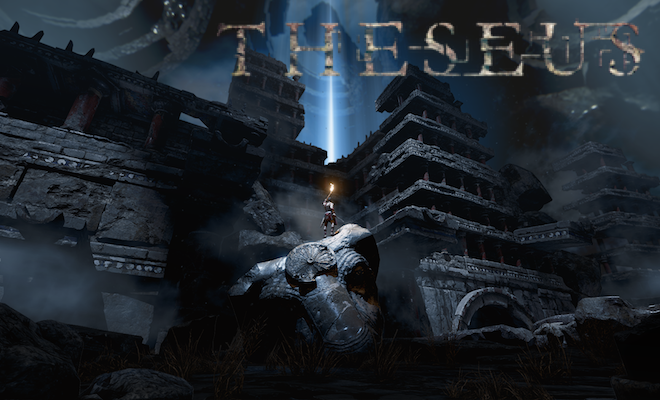I’m still admittedly new to Playstation VR. After playing it at the last few E3s, and a couple of other industry events, I was completely hooked on the technology, but balked at the high adoption price for the rig and accessories. I was finally able to take the plunge, and have since been playing catch up on all of the games, both full and “demo” type, that have come out in the last nine months or so. And in that wild cramming of virtual reality game playing, I’ve yet to see a PSVR game as outright gorgeous as Theseus, from developer Forge Reply.
Going Greek
In Theseus, the player takes control of the titular hero from the Greek myth, as he finds himself in a mysterious maze. Theseus must master the Labyrinth, avoiding a massive Minotaur and his spider-like minions, and with the help of Ariadne, defeat the horrific beast and finally escape. Of course there’s more to it than just escaping the puzzle-like structure and defeating the brutish, hulking monster that guards it. In fact, there’s an other-worldly mystery hanging over the entire game, and by the time the player figures it all out, the game is over.
While traversing a maze in a game seems like a simple task, playing in VR amps up the challenge considerably. Instead of assuming the point of view of Theseus, the player becomes the fixed camera in each room. You control Theseus with the Dualshock 4 controller, moving him around the room, climbing up and down walls, when necessary, and eventually battling monsters with a sword and a torch. But the camera is locked in, usually high up in the corner or off to the side — much like the cameras in the original Resident Evil. This odd placement gives the player full perspective of the environment, and allows for looking around the massive rooms, turning my living room into an ancient mythical structure.
You Are The Camera
There are a few instances where the camera will follow Theseus, usually over his shoulder, and this is done for effect in certain rooms of the maze. All in all, the camera creates a cinematic experience. You aren’t as much living in this world as Theseus as you are recording it all by watching, if that makes any sense. In addition to the Labyrinth, there is another portion of the game, a limbo, or place between worlds, that really shows off the massive scale of Theseus‘ environments.
Theseus uses combat more as a last resort. During the journey, Theseus will find a sword that has some of the Minotaur’s essence in it, and because of that, the sword also serves as a beacon for the beast to find you. Torches and fire are also important in certain areas, and near the end of the journey, both the torch and sword can be used in conjunction to kill the mutant spiders that skitter along the walls and ceiling in certain rooms and then attack you. I found the combat lacking, as pressing the square button initiates an attack, but it’s sluggish, especially when pulling off kill moves. This became a frustration, especially later in the game when swarms of two and three huge spiders attack you.
Theseus Is Gorgeous
Graphically, Theseus is stunning in almost every way. The Unreal engine does a great job to add lighting and water effects to the realistic stone surfaces, and the character models of Theseus and the apparition-like Ariadne look good, for VR. The real winner here is the Minotaur. The first time we see the mythical beast will go down as one of my favorite “oh $#!t” gaming moments in 2017. He is massive — screen-filling massive. Impressively so. This isn’t just a man with a bull’s head. The minotaur in Theseus is designed to scare the crap out of the player. And quietly sneaking around as the great beast walks in the background had me holding my breath more than I’d like to admit. Forge Reply did a great job translating the whole Greek myth of Theseus vs. the Minotaur, giving it a horrific edge that rivals any survival horror games.
We Were Just Getting Started
Unfortunately, Theseus is incredibly short. The Labyrinth can be conquered from start to finish in under two hours, and while there is some replay value in doing the maze over and over — there are some hidden secrets to uncover, and reportedly two endings — the overall experience is hampered by its brevity. I would have very much liked to have seen more of the Labyrinth, more enemies — and better variety of enemies — to fight, and maybe the developer could have included some rooms that offer choices of direction, like a real maze. For a game that gets so much right, it’s sad that its length is the biggest drawback.
Theseus succeeds in many areas: it’s one of the best looking VR games on the PS4, the atmosphere is well done and the camera locations create a sense of both intimacy and scale, while keeping the player firmly immersed in the game’s world. Combat leaves much to be desired, but serves its purpose. All in all, Theseus is one of the best games that I’ve played on the PSVR, and really shows what the system can do in so many ways.
Theseus is available now for the Playstation VR. This review is based off a code provided by the publisher.







